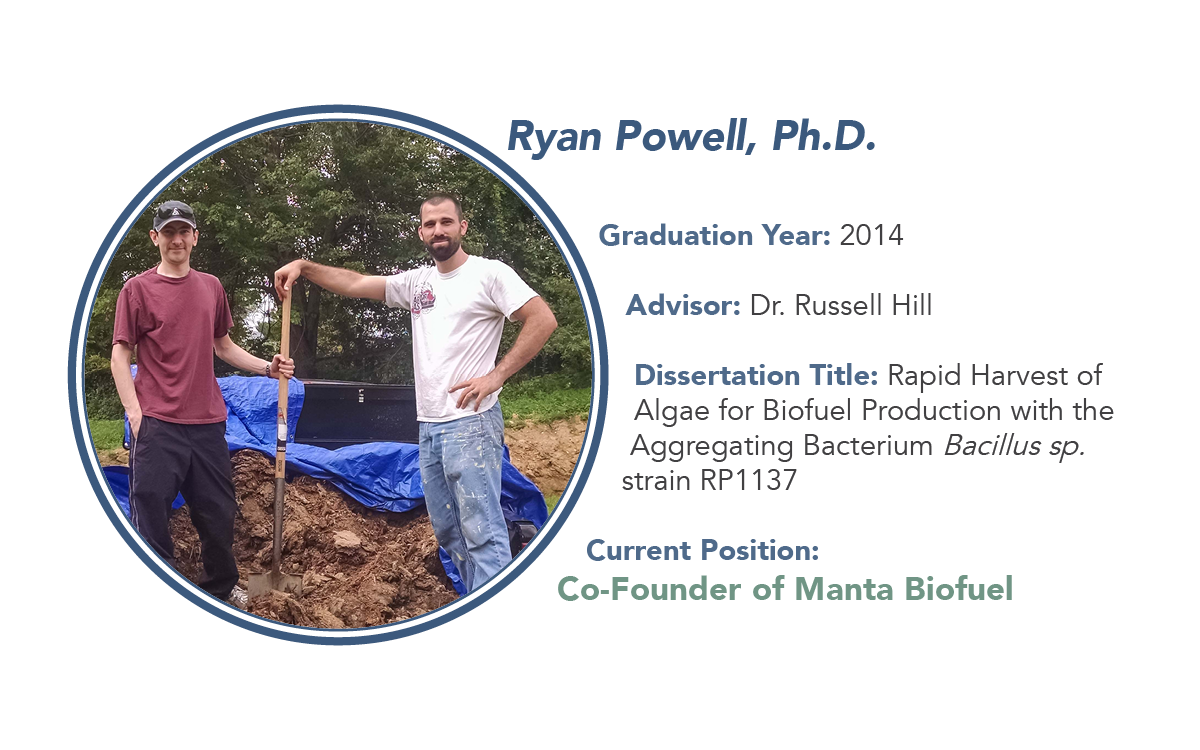Alum Spotlight: Dr. Ryan Powell

At IMET, we hope to prepare graduate students for a wide range of careers, including in academia, industry, entrepreneurship, and government. Working and studying at a university, students are exposed to the world of academia The REEF program has helped students to envision and explore a career in entrepreneurship. In this piece, alumnus and former REEF fellow Ryan Powell speaks about his experience starting his own business, Manta Biofuel.
Growing up on a farm, Dr. Ryan Powell learned from a young age what it means to own a business. Work doesn’t end at 5:00 and you have to step in wherever you’re needed. For Powell, sometimes that means filling out lengthy applications in order to receive grant funding, and sometimes that means shoveling chicken manure into the ponds where he and his team are cultivating algae for biofuel production.
Manta Biofuel (www.mantabiofuel.com), co-founded by Powell and his business partner Onur Unal in 2014, seeks to grow algae, convert it to carbon-neutral crude oil and to demonstrate that this technology can be cost-effective and scalable. Powell developed a new technique for harvesting microalgae as a student in the lab of Dr. Russell Hill at IMET. This technique is low cost and works with diverse algae which enables Powell to grow algae in open ponds, rather than in a sterile lab environment.
Powell began Manta Biofuel at the end of his Ph.D. degree at IMET. When deciding on a career path, he considered multiple options. “I enjoy the creativity that both academia and having a start-up allow,” he said. He was primarily driven to start his business to ensure that the technology he had developed was implemented in the real world where it could do some good. He also chose this pathway due to the increasing difficulty in academia of securing a permanent tenure track position. “To me, starting a business was less risky than trying to pursue a tenure-track faculty position.”
Powell also wasn’t thrilled about the prospect of spending a large fraction of his time writing grant proposals as an academic. Somewhat ironically, Powell spends a lot of his time writing proposals for his business, however, this work has has paid off in several grants that have helped get the company off the ground. Recently, Manta Biofuel was awarded $1 million from the Department of Energy Small Business Innovation Research Program to continue research on developing cost-competitive crude oil from algae. Powell credits his strength in communicating through writing in part to writing articles and his dissertation at IMET. “The writing experience student’s gain during a Ph.D gives them a major advantage when starting a business. This experience allows them to access grant funding more easily than those without this experience.”
One of the main skills Powell had to develop after leaving IMET was managing employees. As Manta Biofuel grew, he experimented with different methods of management and read extensively on the subject. His scientific background comes through when he discusses this learning process. “I’m always trying to find business and management practices that are backed up by data,” he said. “As my role changes, I know I need to keep learning as the company scales.”
When asked if he had any advice for graduate students choosing a career path, Powell said, “While academia is often considered the default pathway, the training you receive as a Ph.D. student prepares you to excel in many different careers. The degree develops skills in writing, design of experiments, critical thinking, data mining, project management and probably most critically the thought process needed to make data driven decisions. These skills are valued outside of academia and open many opportunities to Ph.D. students.”